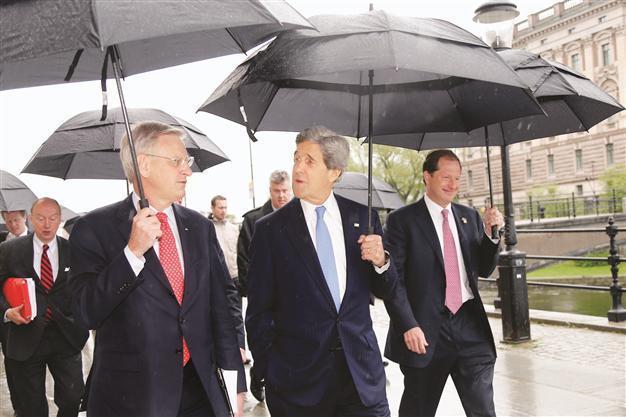Kerry warns Syria to attend June meeting
SOCHI

US Secretary of State John Kerry (C) walks with Swedish Foreign Minister Carl Bildt (L) and US Ambassador to Sweden Mark Brzezinski in Stockholm, Sweden. AP photo
U.S. Secretary of State John Kerry issued a stern warning yesterday to Syria’s government, warning that new help would be given to opposition forces should President Bashar al-Assad’s regime decide to back out of upcoming negotiations aimed at ending Syria’s two-year war.Syria’s Information Minister Omran Zoabi has said Damascus needs more details about the proposed initiative before it decides whether to attend.
“If he decides not to come to the table, it would be another one of President [Bashar] Assad’s gross miscalculations,” Kerry told reporters in Sweden. “I don’t believe that that is the case at this moment.
The Russian Foreign Minister Sergei Lavrov has already given him the names of people who will negotiate.”
“If he miscalculates about that as he miscalculated about his own country’s future over the course of the last years, it is clear the opposition will be receiving additional support,” Kerry said, while not specifying what type of support would be provided, nor from whom.
Washington and Moscow last week called for an international conference to bring representatives of the Syrian regime and the opposition to the negotiating table, with the aim of setting up a transitional government and an open-ended cease-fire. The U.S. and Russia back opposing sides in the Syrian conflict, and the push for talks marks the countries’ first serious joint attempt at diplomacy over Syria in a year.
Kerry also said the exact timing of the meeting was up to the United Nations, but that he expected it would take place in early June, adding that he had spoken yesterday morning with Syrian opposition General Salim Idris, who was committed to the negotiation process.
On the other hand, France warned yesterday that a proposed foreign-backed peace conference would be “very difficult” to organize. “Clearly France is in favor of Geneva 2, but at the same time it’s very difficult,” French Foreign Minister Laurent Fabius told RTL radio.
Putin, Netanyahu discuss Syrian war
“It’s not easy, there must be people from the opposition and people close to the regime who do not have blood on their hands,” Fabius said. Fabius said a preliminary meeting of involved countries would take place at the end of next week. “We are trying to work [on organizing the conference] for the end of May. There will be intermediary steps, at the end of next week, probably in Jordan, then maybe in Paris.”
Meanwhile, Israeli Prime Minister Benjamin Netanyahu was the latest world leader to beat a path to Russia President Vladimir Putin’s door for talks on Syria in recent days, after U.S. Secretary of State John Kerry and British Prime Minister David Cameron met the Russian strongman last week.
Putin and Netanyahu discussed yesterday the conflict in Syria as concern grew about Moscow’s arms deliveries to the Damascus regime and a spiraling death toll.
“I certainly expect to speak with you about the situation in the region, including around Syria,” Putin told Netanyahu at the start of the talks at the Russian leader’s Black Sea residence in Sochi. “Together we can think about how to make it [the Middle East region] more secure and stable,” Netanyahu replied in televised remarks.
Putin said it was important to avoid actions that might aggravate Syria’s civil war, a veiled warning against foreign military intervention or arming anti-government forces. “In this crucial period it is extremely important to avoid any actions that could aggravate the situation,” Putin said after talks with Netanyahu.
Netanyahu did not immediately make clear whether Putin had eased his concerns that Russia was about to deliver an advanced air defense system to Damascus that could undercut the new diplomatic initiative aimed at reaching a political solution.
Foreign Minister Sergei Lavrov said on May 10 that Russia had no new plans to sell the S-300 missile defense system to President Bashar al-Assad’s government but left open the possibility they could be delivered under an existing contract.
















